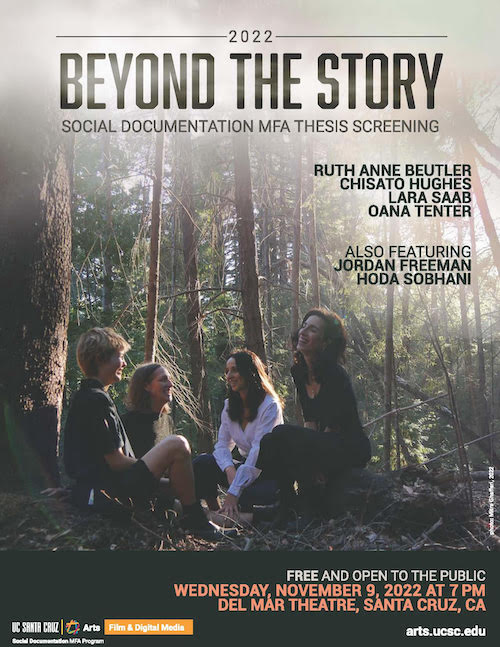Campus News
Social Documentation MFAs to share thesis documentaries at live screening event November 9
UC Santa Cruz’s annual Social Documentation (SocDoc) exhibition returns live and in person for the first time since 2019, free to the public this November 9th from 7-10pm at the Del Mar Theatre in downtown Santa Cruz.

UC Santa Cruz’s annual Social Documentation (SocDoc) exhibition returns live and in person for the first time since 2019, free to the public this November 9th from 7-10pm at the Del Mar Theatre in downtown Santa Cruz. The 15th annual screening, Beyond the Story, presents the premiere of new Masters of Fine Arts thesis documentaries by 2021 and 2022 graduating students in the field of social documentary.
The only program of its kind in the UC system, the SocDoc MFA, founded in 2005, is a unique degree designed to train media makers committed to social change and to documenting communities, cultures, issues, and individuals who are marginalized in the current landscapes of representation. It emphasizes ethical practices and meaningful community involvement to explore urgent issues through socially engaged documentary practices.
The six films presented this year, each approximately 20 minutes in length, share an interest in contested histories and the footprints of the past, often examined through the lens of personal life experiences.
In Futility Season, Hoda Sobhani creates a cinematic letter exchange between herself and her best friend in Iran, Neda, a women’s rights activist arrested during protests in the same year Sobhani emigrated from Tehran to study at UCSC. During the year Neda was in prison, terrible events occurred in Iran that exacerbated both women’s difficulties. Sobhani decided to make the documentary after Neda’s release to give form to their feelings at the time, when they were far from each other and from others who also experienced similar tragedies. Neda has been recently imprisoned again during the current protests in Iran, making this film especially timely and urgent.
Oana Tenter contributes Yesterday Ended Last Night, a film that takes a close look at the intersection of politics and religion in the lives of a Romanian-American Christian community in Arizona and weaves a multigenerational portrait of its members. Many in the church came to the U.S. as refugees fleeing the Romanian socialist dictatorship and now live in the Arizona desert as proud right-wing Americans. In the film, Tenter and her colleague, a Romanian journalist, process their reactions, questioning their own relationship with empathy and identity, as they try to understand how their compatriots have embraced the far-right.
Lara Saab presents Twirling, Not Spiraling. The piece draws from research about life along the coasts of Beirut, Lebanon, where Saab is from, and Santa Cruz, where she studies. The film weaves together personal archives, collected memories, dreams, social media content, and recorded video and sound material, reflecting on the sea, the ocean, and recent events such as the catastrophic explosion in Beirut’s port area in 2020.
Chisato Hughes’ Many Moons is an experimental documentary that scavenges for, reframes, and exorcizes evidence concerning the survivors of Humboldt County’s 1885 Chinese expulsion and the enforced exclusion of Asians in the region for the next 60 years. Born in the county which once boasted it was “free of Chinamen,” the filmmaker uses the documentary to pose questions to the ghost of Charlie Moon, the “last Chinese man of Humboldt County,” and to interrogate history-making.
Ruth Anne Beutler’s LAND/TRUST explores interrelationships of people, plants, land, and labor as it follows Amah Mutsun Tribal Band members’ work to restore a coastal prairie on California’s Central Coast. The film documents the effort to restore the coastal prairie in the Quiroste Valley Cultural Preserve at Año Nuevo State Park, which encompasses the former site of Mitenne, a village of the Awaswas-speaking Quiroste people. In the absence of known Quiroste descendants, The Amah Mutsun Tribal band is currently stewarding the land and maintaining the memory of the Quiroste ancestors.
Jordan Freeman’s Sea State, filmed on a boat he sailed by himself on the ocean, is a visually rich meditation on strategies for survival in a time of convergent crises. He writes, “Safe passage at sea requires an instinctual understanding that no force exists in isolation, a critical lesson for our survival on land. Sea State challenges viewers to understand the crises of our world as related through their points of impact. In a world of accelerating and converging crises, from ecological collapse to the rise of fascism, we can no longer treat the threats which we face as separate or sequential.”
“This is a program of six very different films by diverse artists, each driven to create stylistically unique work full of nuance, detail, and emotion,” says Jennifer Maytorena Taylor, Associate Professor, Film & Digital Media and Director of Graduate Studies. “Made during the pandemic but not made about the pandemic, these films fearlessly explore the effects of upheaval and profound change on individuals, communities, and even the earth itself.”
The screening will be followed by a live Q&A with the filmmakers. The Del Mar Theatre is located at 1124 Pacific Ave, Santa Cruz, CA. The event is free, open to the public, and does not require reservations.